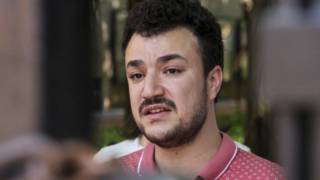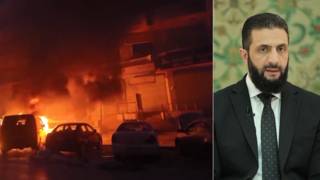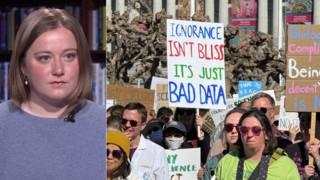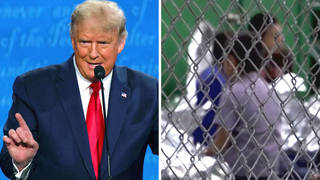
As Trump faced national rebuke for his racist comments against four progressive congresswomen, his administration announced a new rule essentially banning most immigrants from seeking refuge in the United States. The rule, which the ACLU has already vowed to challenge in court, would deny asylum to any migrant who failed to apply for protection in another country they passed through on the way to the U.S. border—including children traveling alone. If enacted, the law would effectively block people from Honduras, El Salvador, Guatemala, as well as Haitians, Cubans and many people from African countries, who come to the U.S. via the southern border. We speak with 2020 presidential candidate Julián Castro about the asylum ban and his immigration reform proposals.
Transcript
AMY GOODMAN: This is Democracy Now!, democracynow.org, The War and Peace Report. I’m Amy Goodman, with Juan González.
JUAN GONZÁLEZ: Well, we continue to look at President Trump’s racist attack on progressive women of color in Congress, as the House of Representatives prepares to vote on a resolution condemning Trump’s tweets telling Representatives Ilhan Omar, Rashida Tlaib, Ayanna Pressley and Alexandria Ocasio-Cortez to, quote, “go back” to where they came from. All four congresswomen are American citizens. Trump’s racist words have been condemned by virtually all of the 2020 Democratic presidential contenders, who are calling his attacks hateful, un-American, xenophobic and cowardly.
AMY GOODMAN: To talk more about this, immigration and other issues, we’re going to Davenport, Iowa, right now, where we’re joined by a 2020 presidential candidate who’s calling Trump out for acting like a white supremacist. Julián Castro was the youngest member of Obama’s Cabinet, where he served as secretary of housing and urban development. Prior to joining the Obama administration, Castro was mayor of San Antonio, Texas, from 2009 to 2014. He is also the identical twin of the head of the Hispanic Congressional Caucus, Joaquin Castro, who just led a delegation to the border detention centers and child jails.
Well, Secretary Castro, welcome to Democracy Now! It’s great to have you with us. Let’s start off by talking about this vote that’s about to happen in the House right now condemning Trump’s racism as he singles out these four women of color and tells them to “go back” to where they came from. Can you respond?
JULIÁN CASTRO: I’m glad to see that so many congressional representatives are stepping up today and condemning President Trump’s racist language.
This is nothing new for this president. We know that he launched his campaign by inciting racial division. And this is called racial priming. We haven’t seen a politician in a long time who has built his career on hate and bigotry and trying to divide people along racial and ethnic lines, as this president has, whether it was failing to immediately condemn those neo-Nazis in Charlottesville early in his tenure or talking about the inability of a judge to do his job because, quote, “he’s Mexican,” or the way that he started off his campaign, by saying that Mexico was sending drug runners and rapists, and that maybe some of them were also good people.
This is a president that knows what he’s doing. This is his strategy. This is his politics. This is how he thinks he won the 2016 election with a narrow Electoral College victory. And I don’t think that it’s a coincidence that he kicked off his 2020 campaign just a couple of weeks ago, and already he’s at it again.
JUAN GONZÁLEZ: Well, Secretary Castro, the president’s attacks on the four congresswomen come as his administration has announced that it would block nearly all migrants from seeking asylum in the U.S., in a new rule that violates both domestic and international law. The rule, which the ACLU has already vowed to challenge in court, would deny asylum to any migrant who failed to apply for protection in another country they pass through on the way to the U.S. border, including children traveling alone. And if it’s enacted, it would effectively block people from Honduras, Salvador and Guatemala from seeking refuge in the United States. I’m wondering your sense of this proposal of the administration?
JULIÁN CASTRO: It’s unconstitutional. I believe that this is going to be overturned in the courts. Obviously, happy to see the continued great work that the ACLU and others are doing on this.
Yeah, this is a president that promised his base that he was going to do something about this, quote, “immigration problem.” And he has irrationally and in a bigoted way, I believe, continued to try and stoke that base, with his Muslim travel ban, with this latest action. But at the same time, he’s actually failed on this issue. What we should have done—what he should have done, from day one of his administration, is actually work with Honduras, Guatemala and El Salvador, in a positive and productive way, as much as we can, so that people can find safety and opportunity at home, instead of having to come to the southern border of the United States.
But those who make it to the southern border of the United States should absolutely be able to make their asylum claim. If I were president right now, I would immediately end this “Remain in Mexico” policy, the metering policy, which is basically playing games with people at ports of entry who want to make their asylum claim. We need an immigration policy that actually looks forward and honors asylum claims and sticks to our tradition in the United States of honoring those claims, instead of this erratic, haphazard and, I believe, bigoted approach that the president is taking.
AMY GOODMAN: You have called—this past weekend at the Netroots Nation conference in Philadelphia, you called for the breakup of ICE rather than the breakup of families. Explain exactly how you would go about doing this as president.
JULIÁN CASTRO: Well, I don’t have to tell y’all or any of the folks watching that ICE has had massive problems as a division of the federal government. Let’s begin by acknowledging that this is not a long-established agency. It was established right post-9/11, 2002, 2003. About a year and a half ago, 19 people who work for ICE wrote a letter. This was unprecedented. Nineteen employees wrote a letter and said that ICE is not functioning the way that it should, that it’s failing.
And so, what I would do is I would actually break apart ICE. I would separate what is now Homeland Security Investigations from the enforcement aspect of ICE, because I believe that we need a total culture change and a totally different approach on enforcement. I would put that back within the Department of Justice, those enforcement actions, and change the way that we do enforcement. I don’t believe that we should have folks going on Greyhound buses up to a hundred miles away from the border; people that are profiling, waiting outside of airline flights as they get into an airport. We need to do this differently. We also don’t need to terrorize families, immigrant families, through threatening ICE raids, which is what this president is doing. So, I would separate that function. There would no longer be an ICE as we know it. There would be a changed, better, more effective, but more humane and compassionate enforcement than we have now.
JUAN GONZÁLEZ: Secretary Castro, if we can, I’d like to talk to you a little bit about the—your impulse to decide to run for president and some of your own history, which maybe be a lot of people who are watching this show or listening to the show don’t know that history. Your mother was a major activist in the Mexican-American community, Rosie Castro. She was a member of MAYO, the Mexican American Youth Organization. She was one of the co-founders, with José Ángel Gutiérrez, of La Raza Unida Party. And there are some that say she was much more radical than her two sons, who have become more liberal or progressive Democrats, but not necessarily in their mother’s mold. I’m wondering if you could talk about your mother’s influence on your politics and your involvement, and how she’s regarding your race.
JULIÁN CASTRO: Yeah, you’re right. You know, when my mother was young, she was a hellraiser. She grew up in a time, with my grandmother, who raised her as a single parent, when she saw a tremendous amount of discrimination against the Mexican-American community in South Texas. She was growing up in San Antonio. And her way of dealing with that was to get politically active. And she got active first in the Young Democrats and then in a number of organizations, including the Raza Unida Party, which was a third party at the time, that said, “Hey, look, neither the Democrats nor the Republicans are ensuring that this Mexican-American community is able to do basic things, like have a decent quality of life, get a good education, pursue decent job opportunities.” And so, I’m proud of my mother’s activism, because I know that it’s in part because of her activism and the activism of so many other folks that we have made some progress in this country.
But I also understand that we still have a lot of progress to make. In fact, when my mom was 23, she ran for city council with this slate called the Committee for Barrio Betterment. And I still have their poster. It was the first thing that I put into my office when I became mayor at City Hall and when I became secretary of HUD in the Obama administration. Their slogan was “Give government back to the people.” And it reminds us that the more things change, the more they stay the same. There are so many of the things that folks were fighting for back then that we still need to accomplish today, whether it’s ensuring that people can get a good education, ensuring in our criminal justice system that just because you’re poor or you’re a person of color, that you can get good representation and you can get justice, and making sure that we’re able to push back against politicians like Donald Trump that clearly use racial division to profit politically.
JUAN GONZÁLEZ: And given that social justice bent, you’re one of the few presidential contenders among the Democrats that have raised the issue of homelessness in America. And could you talk about why you feel that’s important to debate and what you would do as president to essentially deal with an epidemic of homelessness that’s occurring across the country?
JULIÁN CASTRO: Well, I see housing as a human right. I don’t believe that there’s any reason—just like there’s no reason, in the wealthiest nation on Earth, that anybody should ever go without healthcare in this country, there is no reason that anybody should go without a basic, safe, decent place to live in our country. And I saw how we can make progress on homelessness. During the Obama administration, the administration set a goal of ending veteran homelessness. And between 2010 and 2016, it was reduced by 47%. We almost cut it in half in six years.
I believe—and my plan calls for—that we can end homelessness, family homelessness, chronic homelessness, youth homelessness, by 2028, if all of us work together to make the right investments in driving down those numbers. It’s important to me, because where I come at this is that we need a basic respect for all human beings, whether it’s through their healthcare or housing. And that’s what’s missing in this administration. You can see that when you look at these images of men kept basically in cages and children not given toothbrushes or soap or basic things that they need, and separated cruelly from their parents. We need to return to a basic respect and compassion for people that is sorely missing right now.
AMY GOODMAN: Secretary Castro, what made you decide to run now for president, as opposed to, for example, running for senator from Texas, perhaps, against Senator [Cornyn]?
JULIÁN CASTRO: Yeah, a couple of things. First, that my experience is originally as mayor of San Antonio, in local government, and then as secretary of housing and urban development, as a federal executive. And so I see my experience as directly related, as a federal executive, to the office of the president, which is what you are—a federal executive. On top of that, like a lot of Americans, I see that we need a complete change in leadership in the Oval Office. And I believe that people are ready for a new generation of leadership, that this is the right opportunity.
And, you know, I also feel very blessed with the opportunities that I’ve had in this country. And during my whole time in public service, the thing that I’ve been focused on is making sure that no matter who you are in this country, that you could have the same kind of opportunities that my brother Joaquin and I were able to have, so that you can reach your dreams. And when I get out there and talk to people throughout the United States, whether here in Iowa or in my home state of Texas, or wherever they are, whoever they are, I always talk about keeping my eye on the ball to make sure that no matter how much money they have or don’t have, or their background, that I’m going to work hard for them, so that they can achieve their American dream, too. I believe that if we pursue the right kind of investments, if we pursue a basic respect and compassion for people, and the social and racial justice that we need to continue pursuing, that we can achieve that.
AMY GOODMAN: We’re talking with Democratic presidential candidate Julián Castro. He’s in Davenport, Iowa. We’re going to talk to him about the McDonald’s workers’ protest this week, as well as his positions on Amazon, and continue to talk about immigration and his being hailed as the kind of breakout star, perhaps, along with Elizabeth Warren, in that first debate of the Democratic presidential primaries that just took place. This is Democracy Now! We’ll continue with Julián Castro in Davenport, Iowa, in a minute.
[break]
AMY GOODMAN: “Wonderful Everyday” by Chance the Rapper & The Social Experiment. This is Democracy Now! I’m Amy Goodman, with Juan González, as we spend the rest of the hour with Julián Castro, the 2020 Democratic presidential candidate, who joins us from Davenport, Iowa, hailed as the breakout front-runner in the debate, winner of the first debate, along with Elizabeth Warren, of, what, 20 people who debated over the two days.
We’re going to turn to a clip right now from that very first debate last month, when Julián Castro and former Texas Congressmember Beto O’Rourke clashed over immigration. This begins with the moderator, José Díaz-Balart of Telemundo, who raised the issue of undocumented children held in detention and the image of Óscar Alberto Martínez Ramírez and his daughter Valeria, who died attempting to cross the Rio Grande after fleeing El Salvador. Díaz-Balart directed the question to Julián Castro.
JULIÁN CASTRO: Let’s be very clear. The reason that they’re separating these little children from their families is that they’re using Section 1325 of that act, which criminalizes coming across the border, to incarcerate the parents and then separate them. Some of us on this stage have called to end that section, to terminate it. Some, like Congressman O’Rourke, have not. And I want to challenge all of the candidates to do that.
BETO O’ROURKE: In fact—
JULIÁN CASTRO: I just think it’s a mistake, Beto. I think it’s a mistake. And I think that if you truly want to change the system, then we’ve got to repeal that section. If not—
JOSÉ DÍAZ-BALART: Thank you.
JULIÁN CASTRO: —then it might as well be the same policy.
BETO O’ROURKE: José, let me—
JOSÉ DÍAZ-BALART: Very briefly.
BETO O’ROURKE: Let me respond to this, very briefly.
JOSÉ DÍAZ-BALART: Since you were—OK.
BETO O’ROURKE: Actually, as a member of a Congress, I helped to introduce legislation that would ensure that we don’t criminalize those who are seeking asylum and refuge in this country.
JULIÁN CASTRO: I’m not talking about—
BETO O’ROURKE: If you’re fleeing—
JULIÁN CASTRO: I’m not talking about the ones that are seeking asylum.
BETO O’ROURKE: If you’re fleeing desperation, then I want to make sure—
JULIÁN CASTRO: I’m talking about—
BETO O’ROURKE: I want to make sure that you’re treated with respect.
JULIÁN CASTRO: I’m talking about everybody else. I’m still talking about everybody else.
BETO O’ROURKE: But you’re looking at just one small part of this. I’m talking about a comprehensive rewrite of our immigration laws.
JULIÁN CASTRO: That’s not true.
BETO O’ROURKE: And if we do that, I don’t think it’s asking too much—
JULIÁN CASTRO: That’s actually not true. I’m talking about—
BETO O’ROURKE: —for people to follow our laws when they come to this country.
JULIÁN CASTRO: I’m talking about millions of folks. A lot of folks that are coming are not seeking asylum. A lot of them are undocumented immigrants, right? And you said recently that the reason you didn’t want to repeal Section 1325 was because you were concerned about human trafficking and drug trafficking. But let me tell you what: Section 18—
JOSÉ DÍAZ-BALART: Secretary—
JULIÁN CASTRO: Title 18 of the U.S. Code, Title 21 and Title 22 already cover human trafficking.
BETO O’ROURKE: If we apprehend a known smuggler or drug trafficker—
JULIÁN CASTRO: I think that you should do your homework on this issue.
BETO O’ROURKE: —we’re going to make sure that they are deported and criminally prosecuted.
JULIÁN CASTRO: If you did your homework on this issue, you would know that we should repeal this section.
JUAN GONZÁLEZ: That was the exchange between Secretary Castro and Beto O’Rourke in the first Democratic presidential debate. Julián Castro, could you summarize what the differences were between you and Beto O’Rourke there? And also, could you talk about the fact that as a member of the Obama administration, President Obama himself took much criticism for being called by many of the Latino civil rights groups as the “deporter-in-chief” because of the massive deportations that occurred under his administration?
JULIÁN CASTRO: Yeah. So, we were having a discussion, on that first debate, about whether Section 1325 of the Immigration and Nationality Act should be repealed. I believe that it should be repealed. And this act essentially is what says that it’s a misdemeanor crime to cross the border. This act was passed in 1929. But between 1929 and about 2004, it actually was rarely enforced. Border crossing was rarely enforced as a crime. Instead, it was just treated as a civil violation, and people who crossed were subject to deportation, but that’s a civil process.
It started to be weaponized to a much greater extent by this Trump administration. That section was weaponized to charge migrant parents with a crime and then use that to separate them from their little children. So, my point has been, look, we can go back to the way that we used to treat these things, as a civil violation, and get rid of this law that allows this administration, and would allow some future administration perhaps, to weaponize it and to separate migrant parents from their children. I’ve said I want a guarantee that we never see this kind of family separation, this cruel family separation, again. And the only way to help guarantee that is to repeal that section.
Congressman O’Rourke has refused to say that he would do that. He says that—he had said that there were other things that we could do. And, you know, Senator Warren and a number of other people who are running—in fact, I think eight out of 10 people the next night—they were asked, “Would you repeal Section 1325?” Eight out of 10 of the people standing on that stage said that, yes, they would. And so I’m glad that about half of the Democrats that are running in 2020 recognize that we have to do that.
Now, I was part of the Obama administration. Before I was part of the Obama administration, when I was mayor of San Antonio, I recognized some of the shortcomings of the administration when it came to this issue of immigration. I was critical of the administration for some of the things that it was doing. I believe that in some ways the administration did get better as time went by. You think about DACA and DAPA, the protections that it tried to offer to those young people and also their parents.
But look, Republicans and Democrats, it’s true, have not done what needs to be done on this issue. And I’ve put forward what I call a “people first” immigration plan, that would do this 21st century Marshall Plan with Central America that would put all undocumented immigrants—DREAMers and their parents, but not only them, all undocumented immigrants—who have not committed a serious crime, which is the vast majority, are law-abiding folks here in the U.S.—I would put them on a pathway to citizenship. I would also bring back thousands of veterans who have been deported, who served our country honorably, and create an independent immigration judiciary, so that we have enough judges and support staff to actually get through these asylum claims and these cases in a more timely way.
And then, finally, I would improve the legal immigration system that we have, by making family reunification more possible. There are 4.4 million family members out there of people who are in the United States, who we should reach out to and allow to apply for citizenship, and do that in a more timely manner.
And we don’t take in the number of refugees on an annual basis that even Congress has allowed for the country to take in. They set that at 110,000 refugees annually in the late 1970s or early 1980s. Right now it’s between 30,000 and 40,000. I believe that we should at least go up to that cap of 110,000. Those are some of the things that my immigration plan would do.












Media Options